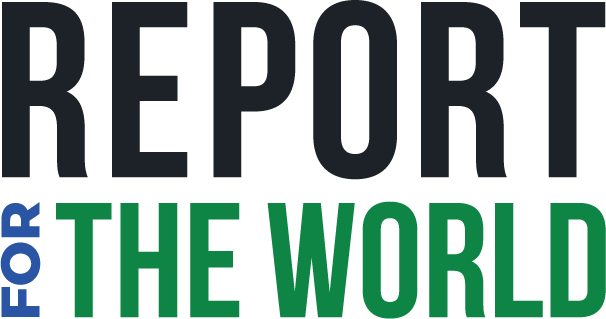Vivian Chime is a journalist covering climate change for TheCable through Report for the World.
The interview has been edited for length and clarity.

When you began considering career options, what did you find compelling about a career in journalism?
At first my journalism journey started out as a childhood flare for liking people I see on television. I wanted to be like them, talk like them, be able to analyze societal issues like them. I was intrigued by what they did and I remember telling my friends at school that I would be like those on TV someday. When I decided on a university degree, I chose to study mass communication. What I find compelling about a career in journalism is the ability to be the voice of the masses, to tell their stories, demand justice on their behalf and hold the government accountable. To me that is like doing the Lord’s work. It is tangible and fulfilling, especially when you see results and change because you did a report. So yeah, I would choose journalism anytime.
How did you become interested in the environment as a beat?
I started environment reporting as a youth corps member serving in Cross River, southern Nigeria. I had been given a slot by the radio station where I worked at the time and which was my primary place of assignment. So my manager at the time had asked me to use the slot to start a radio program on the environment to talk about environmental issues in the local community where the radio was located. There was a dumpsite close to the radio station and people around there were coming down with illnesses, having breathing issues, and could not properly ventilate their homes due to pollution and stench from the dumpsite. So I began reporting on that, and soon began going to communities to talk to them about their environmental issues. The program became more interesting by the day as people called in to complain about environmental issues in their areas ranging from pollution, to erosion, to flooding. And being a state that holds some of Nigeria’s remaining biodiversity hotspots, the program got the attention of the environment ministry in the state which had to send their representatives to always be on my program to talk about their activities, respond to citizens and also promise to address their complaints. This got me more interested in the environmental beat and I began researching and reading up more on it. Through a fellowship with Climate Tracker, I was better groomed and educated on what climate change is all about, the impacts, the causes and the measures needed to address it. The fellowship opened my eyes to how climate change is a factor of some of the challenges faced in my country such as conflicts, diseases, displacements, food insecurity and poverty.
A story of yours that has really stuck with me was one about the connections between climate change and cholera outbreaks in Nigeria. For me, it seemed like a striking example of the consequences of climate change on everyday life. How do you respond to skeptics of the consequences of climate change and its effects on everyday life?
Climate change skeptics are only in self denial. They would rather live in an illusion than reality. Climate change is as real as daylight and we are all victims of its impacts. So all I try to do is through my reporting show the impacts, how it is connected to climate change, and speak to credible experts who help explain and break down the issues. I also try to draw up real life anecdotes and comparisons that make people realize that things did not used to be like they are now but have actually changed over the years.
I do not feel I have told a quarter of the stories that need to be told on climate change in Nigeria and I really would want to dedicate my years of work to telling these stories and bringing out the many dimensions to it.
What are some of the challenges of reporting on the environment and climate change in Nigeria?
Insecurity is one major challenge: There are stories I would love to pursue in some communities but due to the violence and insecurity in such areas, I am not able to. For example, I long to visit northern Nigeria and report on degraded landscapes. But due to the insecurity in the region I have not been able to really carry out the story ideas I intend to do there.
Access and language are another barrier. I have not gotten access to some of the communities I want to visit, and Nigeria’s linguistic diversity means I do not speak many of these languages. Without access and language fluency, it is difficult to visit a community and begin asking questions.
In some communities, traditional biases do not allow people to believe climate change is real: Some feel that when the rains don’t come and their crops fail, it means the gods are angry at them. They would rather believe such fallacies than attribute their problems to climate change. It can be hard to get across to those people and that’s a challenge.
There is also politics. Sometimes you set out to pursue a story, only to find out that environmental degradation is being backed by the government or an influential member of society who will do anything and everything to frustrate you. Sometimes you realize even community members have been bought over and would rather not speak to you about the crime going on in their environment.
What stories in Nigeria would you like to see more attention called to by the international press?
I would like to see more attention given to stories on environmental crime and justice, especially related to fossil fuels. Many communities in Nigeria are suffering as a result of fossil fuel exploration and it really cannot be talked about enough until the government starts doing something. Many have lost their lives and livelihoods as a result. Coal mining across Nigeria has increased incidences of gully erosion and loss of homes.
We also need to shine a light on how resource scarcity is fueling insecurity in the northern region. The Great Green Wall, which was supposed to be a solution, has not seen much progress. What is impeding its success?
Food insecurity is a major challenge in Nigeria right now, too. It would be great if attention is brought to ways and systems through which farming activities can be improved for better productivity amid the climate challenges.
What have you found to be the most impactful story you have written so far as a Report for the World corps member? Why was it impactful?
It is hard to really point out one and say this is it because a story could have helped someone understand a concept, educated someone, alleviated the plight of someone or drawn government attention. And stories travel. I recall a meeting I had with the British Council; they mentioned my story on climate change and cholera, and how it is good that we can begin to draw up some of these connections between climate change and everyday occurrences. It felt good to know that my story had traveled that far to people in other countries, fostering conversations around such issues. Another story I did on coal mining in a Nigerian community was also recently recognized by the Nigerian Association of Women in Agriculture that is working to help women farmers in the community who are losing their livelihood due to coal mining. I do not feel I have told a quarter of the stories that need to be told on climate change in Nigeria and I really would want to dedicate my years of work to telling these stories and bringing out the many dimensions to it. To me, there are still lots of stories to tell and more impact to be made.

